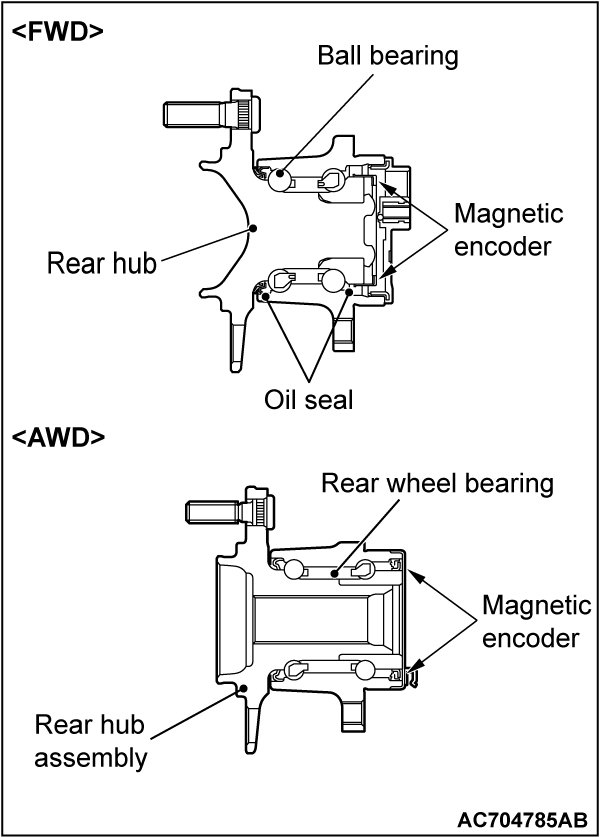DTC C1044 Abnormality in periodical signal for RR wheel speed sensor
OPERATION
- Each wheel speed detecting section is a kind of a pulse generator. It consists of the encoder (plate on which the north and south pole of magnet are arranged alternately) for detecting the wheel speed, which rotates at the same speed of the wheels, and the wheel speed sensor. This detecting section outputs the frequency pulse signals in proportion to the wheel speed.
- The pulse signals generated by the wheel speed detecting section are sent to ASC-ECU. ASC-ECU uses the frequency of the pulse signals to determine the wheel speed.
DTC SET CONDITIONS
ASC-ECU monitors the signals from each wheel speed sensor while the vehicle is being driven. If any periodical drop is found in these sensor signals, ASC-ECU will set the relevant DTC.
PROBABLE CAUSES
Current trouble
- Excessive gap between the wheel speed sensor and the wheel speed detection encoder
- Adhesion of foreign materials on the wheel speed sensor
- Wheel bearing malfunction
- Deformation of the wheel speed detection encoder
- Adhesion of foreign materials on the wheel speed detection encoder
- Malfunction of wheel speed sensor
- Improper installation of the wheel speed sensor
- ASC-ECU malfunction
- The number of poles on the Magnetic encoder for wheel speed detection (N-pole and S-pole) is changed
Past trouble
- When DTC C102B is also set, carry out diagnosis with particular emphasis on wiring harness and connector failures between ASC-ECU and the wheel speed sensor. For diagnosis procedures, refer to How to treat past trouble (Refer to GROUP 00 - How to Use Troubleshooting/How to Treat Past Trouble
 ).
). - When DTC C102B is not set, the following conditions may be present:
- Some wheels slip
- Unstable vehicle attitude
- External noise interference
- Vehicle ran with the parking brake applied.
- Rotate only two wheels with drum tester
DIAGNOSIS
STEP 1. Using scan tool MB991958, diagnose the CAN bus lines.
Use scan tool to diagnose the CAN bus lines.
Is the check result normal?
STEP 2. DTC recheck after resetting CAN bus lines
STEP 3. Using scan tool MB991958, check the DTC
Check that the DTC C102B is also set.
Is the DTC C102B also set?
STEP 4. Check for wheel speed sensor <RR> installation
Check how the wheel speed sensor <RR> is installed (Disconnection of wheel speed sensor <RR>, loose mounting bolt, etc.).
Is the check result normal?
STEP 6. Check for wheel bearing looseness
Is the check result normal?
STEP 7. Check of wheel speed detection encoder
Check the encoder for adhesion of foreign materials or deformation. (Adhesion of foreign materials) : Remove the foreign materials and clean the encoder so as not to disturb the magnetization pattern on it while taking care of the magnet, magnetic substance, and magnetic attraction.
(Adhesion of foreign materials) : Remove the foreign materials and clean the encoder so as not to disturb the magnetization pattern on it while taking care of the magnet, magnetic substance, and magnetic attraction.
Is the check result normal?
 (Adhesion of foreign materials) : Remove the foreign materials and clean the encoder so as not to disturb the magnetization pattern on it while taking care of the magnet, magnetic substance, and magnetic attraction.
(Adhesion of foreign materials) : Remove the foreign materials and clean the encoder so as not to disturb the magnetization pattern on it while taking care of the magnet, magnetic substance, and magnetic attraction.STEP 8. Check whether the DTC is reset.
(1) Erase the DTC.
(2) Drive the vehicle at 12mph (20 km/h) or higher.
| note | The ABS warning light does not turn OFF in some cases unless the vehicle runs at 12mph (20 km/h) or higher. |
Is DTC C1044 set?
STEP 9. Check whether the DTC is reset.
(1) Erase the DTC.
(2) Drive the vehicle at 12 mph (20 km/h) or higher.
| note | The ABS warning light does not turn OFF in some cases unless the vehicle runs at 12 mph (20 km/h) or higher. |
Is DTC C1044 set?
 The procedure is complete.
The procedure is complete.![[Previous]](../../../buttons/fprev.png)
![[Next]](../../../buttons/fnext.png)

